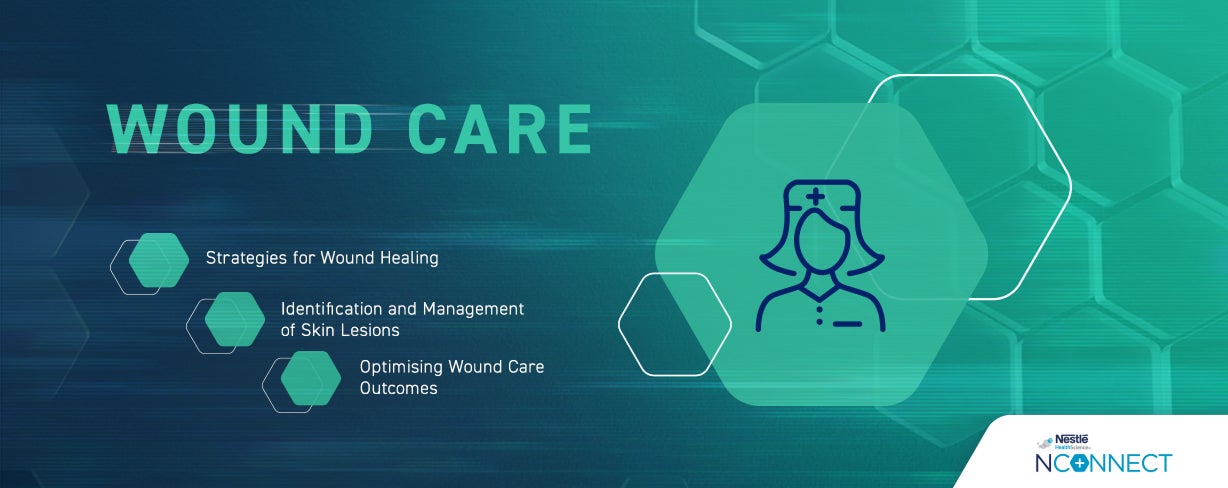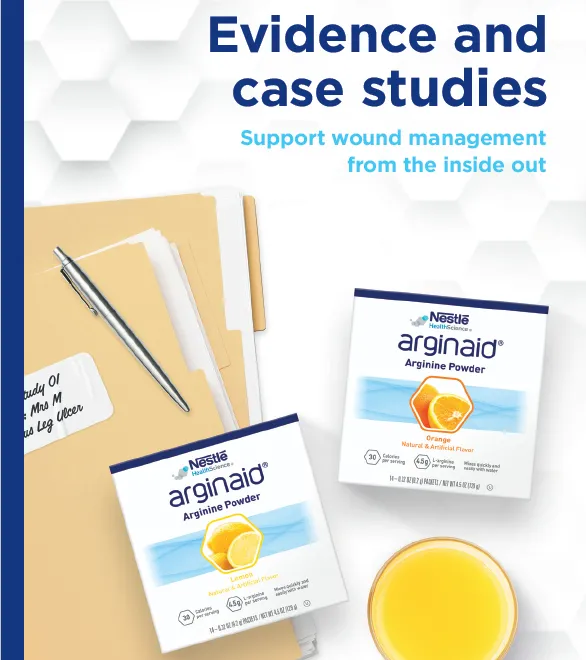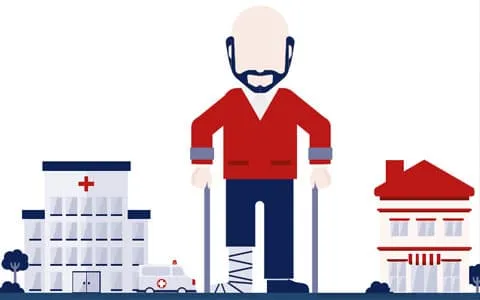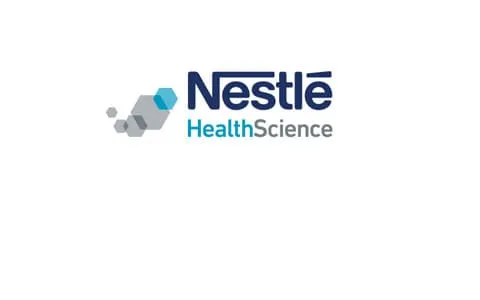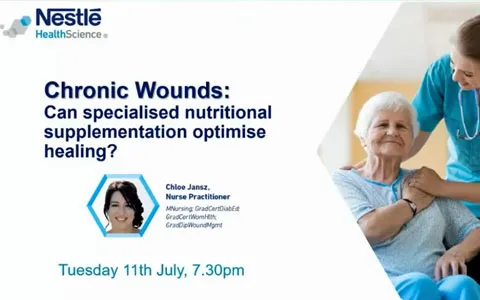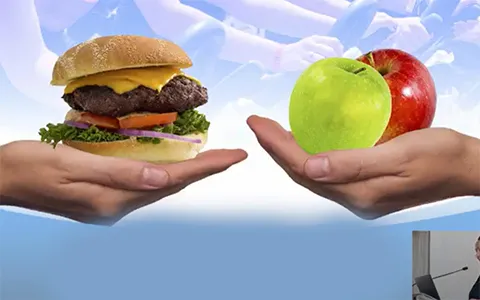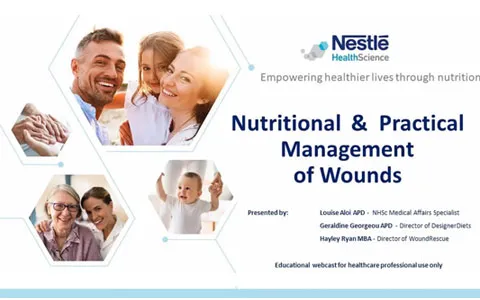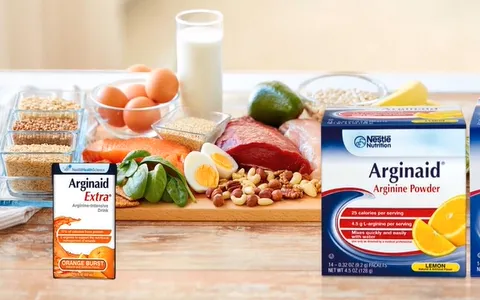Wound Care
Highlight of the month
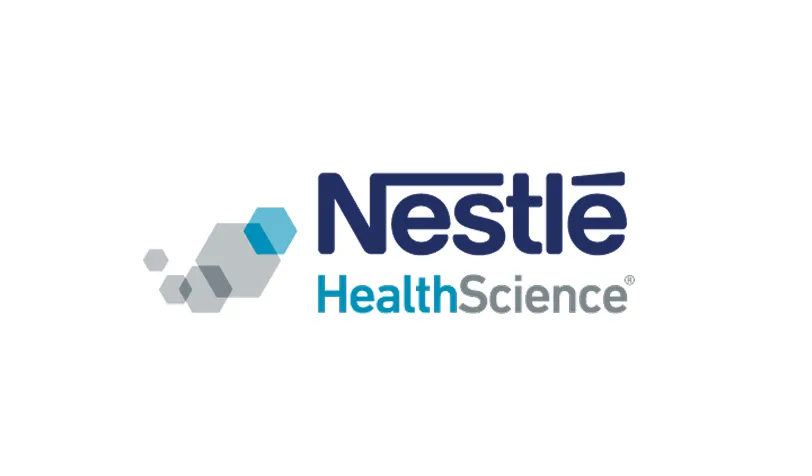
Wound Management and ARGINAID for Patients
This video created by Nestle Health Science describes to patients suffering from chronic wounds the value of nutrition during wound management. It also outlines the various types of foods such as carbohydrates, proteins, vitamins and other minerals and the crucial roles that they play in the wound healing process.
See moreA general fact sheet for patients regarding nutrition for wound healing. This online resource outlines nutrients that play a key role in the process of wound healing such as energy, protein and hydration as well as various vitamins and minerals and where patients can receive them from. This online fact sheet was written by Dietitian Connection.
This brochure summarises the pivotal clinical data supporting the use of ARGINAID along with actual, real world, case examples. Additional information about the usage, key benefits, nutritional and ordering information for ARGINAID at the conclusion of this brochure.
A brief guide for those using ARGINAID with information on essential nutrients and foods that assist with wound healing, as well as practical tips to improve nutritional intake. This guide includes an overview of nutrient intake guidance, meal planning suggestions, as well as practical tips to help encourage a balanced diet.
An inspiring recipe book with easy to create and delicious recipes for ARGINAID powder. The recipe book also provides a brief overview of the key role which ARGINAID plays in the wound healing process.
This brochure outlines the prevelance of wounds such as pressure ulcers in Australia as well as the associated economic expenditure. ARGINAID use can deliver considerable costs savings in the institutional management of these wounds. This is demonstrated in the brochure which highlights a recent economic evaluation of supplementation with disease specific oral nutritional formula such as ARGINAID in the management of wounds.
A comprehensive guide focusing on the value of nutrition in wound management, specifically written for health care professionals. This guide aims to provide simple advice on the role of nutrition in wound healing for healthcare professionals involved in the management of wounds; provide practical guidance on when and how to implement nutritional support to help promote wound healing and summarise the evidence for the relationship between nutrition and wound healing.
External Link
An eLearning module from Nestlé Health Science which discusses nutrition for wound healing and management. This education module goes through the three stages of wound healing, why wounds may fail to heal, the nutritional management of wounds and highlights individuals who are most at risk of pressure injuries.
This article aims to review the latest nutrition care recommendations for the prevention and treatment of pressure injuries, including recommendations tailored to special populations. A secondary objective is to translate nutrition recommendations into actionable steps for the healthcare professional to implement as part of a patient plan of care.
Malnutrition is known to contribute to wound development and impair wound healing through reduction in the availability of nutrients to maintain optimal cell maintenance and repair. This review examines studies from the last decade to identify evidence for the effectiveness of nutritional interventions in wound healing. Studies reported identified included 61 primary studies and 6 systematic reviews.
Evidence based guidelines by the Trans Tasman Dietetic Wound Care Group on the dietetic management of adults with pressure injuries. The recommendations made are designed to guide practice and assist in the decision making process that is undertaken when assessing and treating patients. A Trans-Tasman approach was taken for the review of these guidelines to facilitate use by New Zealand Registered Dietitians as well as Australian Accredited Practicing Dietitians.
This pilot study demonstrates the potential for a specialised wound healing nutritional supplement to accelerate the rate of pressure ulcer healing in spinal cord injury patients. A 2.5-fold greater rate of healing was observed in patients consuming the arginine-containing nutritional supplement until full healing compared with those who ceased taking the supplement.
Algorithm for prevention of pressure injuries
In this clinical study, hospital inpatients with pressure ulcers were randomised to receive daily a standard hospital diet; a standard diet plus two high-protein/energy supplements; or a standard diet plus two high-protein/energy supplements containing additional arginine, vitamin C and zinc. Subjects receiving the arginine-containing nutritional supplement had a significantly improved rate of pressure ulcer healing over the course of three weeks.
In this clinical study, spinal-cord injured patients with pressure ulcers received a commercial powdered nutritional supplement containing 9g of arginine per day. An approximate 2-fold improvement in pressure ulcer healing was seen in well nourished community spinal patients receiving the arginine-containing nutritional supplement, compared with historical controls.
Videos
Chloe Jansz discusses the wound management journey of real case studies of individuals with different types of chronic wounds. Learn about what to look for when assessing wounds, what tools are available in the wound consultant’s toolbox, and the importance of specialised nutrition to assist with the healing of chronic wounds.
Pressure injury guidelines suggest high calorie/high protein nutritional intervention that contains supplemental L-arginine and increased amounts of zinc and other antioxidants for malnourished or at-risk patients with stage 2 or greater wounds. Dr. Fife shares her process of screening for malnutrition and the additional evidence supporting a nutritional algorithm used in her wound clinic. Two case study examples of limb salvage demonstrate use of high protein L-arginine supplemented immunonutrition.
Hear from Hayley Ryan, Director of Wound Rescue and Acting CEO of Wounds Australia, as she discusses the importance of nutrition in the management of wounds. This includes the requirement for sufficient protein and arginine - a conditionally essential amino acid which supports wound healing by promoting protein synthesis, nitric oxide production and collagen formation.
An informative webcast from highly experienced and regarded dietitian Geraldine Georgeou (APD) and wound clinical consultant Hayley Ryan on the nutritional and practical management of wounds in everyday clinical practice. The webcast explores various topics such as the role of arginine in healing, the cost benefits of ARGINAID for faster wound healing in the institutional setting as well as the value and need for close collaboration with dietetics and wound care specialist nurses.
This video briefly describes the wound management process and outlines the key factors that help a wound heal such as the amount of protein, which a lack of can decrease capillary formation, collagen synthesis and fibroplast proliferation. The explanation of wound healing is accompanied by a description of the mode of action of argenine and ARGINAID in the wound management process.
